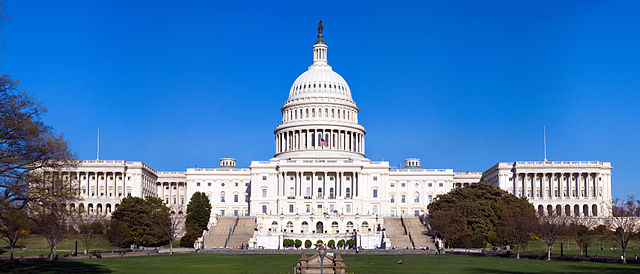
COOL-fuelled trade war likely averted as U.S. bill would repeal labelling law
by Alexander Panetta, The Canadian Press

Vote on ending country-of-origin labelling will take place in coming days

U.S. Congress will vote on a will later this week that will repeal the controversial meat labelling. Earlier this month, the WTO authorized Canada and Mexico to impose $1 billion in tariffs against the U.S. if the law was not changed. PHOTO: Noclip, via Wikimedia Commons
WASHINGTON—A trade war between Canada and the U.S. appears to have been averted.
The U.S. Congress has drafted legislation that responds to Canadian and Mexican demands on meat labelling, the subject of a dispute at the World Trade Organization.
The bill would repeal mandatory country-of-origin labelling on beef and pork, should it pass a vote in the coming days.
That provision is embedded in two pages of a monster 2,000-page bill crafted in marathon negotiations between Republican and Democratic leaders.
Canada and Mexico had been poised to immediately impose $1 billion in tariffs on a wide range of American products including wine and frozen orange juice following wins at the WTO.
Canada’s ambassador to the U.S., Gary Doer, welcomed the news but said he wouldn’t be celebrating until the bill passes both chambers of Congress and gets signed by the president.
Votes on the bill could happen later this week, or early next week.
Supporters of country-of-origin labelling say consumers deserve to know where their meat comes from. Opponents say it doesn’t do anything for safety—for which there are inspections.
Those critics call it a thinly disguised protectionist measure, designed to complicate importing meat from abroad into the U.S. They say Canadian meat exports plummeted as a result of decade-old country-of-origin labelling rules.
John Masswohl of the Canadian Cattlemen’s Association pointed to the example of Tyson Foods. He said Canada used to export beef to four of its U.S. facilities, and now exports to only two—and only on one day per week, so that it can segregate Canadian cows from American ones and apply the proper country-of-origin labels.
“We think this is going to have a huge impact,” Masswohl said in an interview Wednesday.
“And it could have a pretty immediate impact in terms of the prices we receive.”
The bill lifts beef and pork from the list of products subject to country-of-origin labelling, or COOL, requirements. But that’s only one provision in a major piece of legislation that will keep the U.S. government funded.
It might be most remembered in the U.S. for another provision: a relaxing of the 40-year-old quasi-total ban on oil exports from the U.S., imposed amid the energy scare of the 1970s.
That provision could have a huge impact on American energy exports, not to mention a trickle-down effect on the U.S.’s biggest oil supplier: Canada.